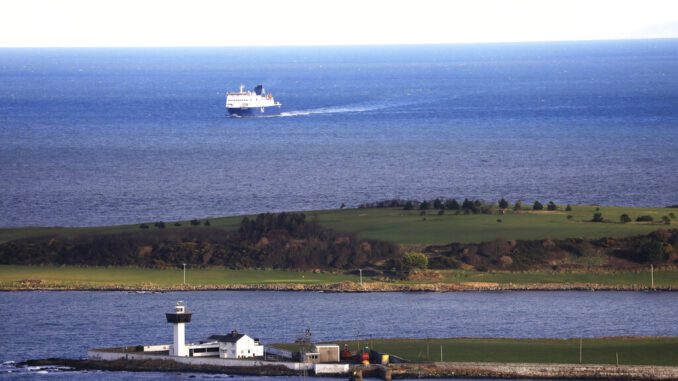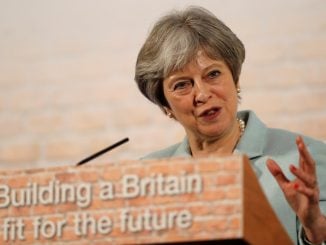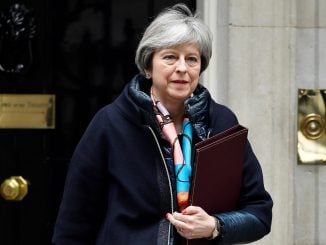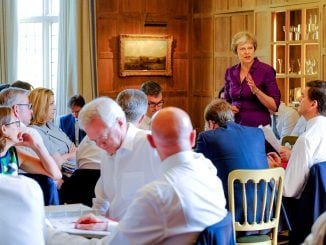
LONDON — The British government said Wednesday that post-Brexit trade rules it negotiated with the European Union “cannot go on” and need a major rewrite, straining already tense U.K.-EU relations.
The government said Britain would be justified in unilaterally suspending the legally binding Brexit agreement but had decided not to do so just yet.
Since the U.K. left the EU’s economic embrace at the end of 2020, relations have soured over trade arrangements for Northern Ireland, the only part of the U.K. that has a land border with the 27-nation bloc. The divorce deal the two sides struck before Britain’s departure means customs and border checks must be conducted on some goods moving between Northern Ireland and the rest of the U.K.
The regulations are intended to keep an open border between Northern Ireland and EU member Ireland, a key pillar of Northern Ireland’s peace process. But they have angered Northern Ireland’s British unionists, who say they amount to a border in the Irish Sea and weaken ties with the rest of the U.K.
Britain accuses the EU of taking a “purist” approach to the rules that is causing unnecessary red tape for businesses, and has called for the bloc to show “pragmatism.”
Brexit minister David Frost said Britain had tried to implement the arrangements “in good faith” but that they were causing a severe burden on businesses and society in Northern Ireland.
“Put very simply, we cannot go on as we are,” he said Wednesday in Parliament’s upper chamber, the House of Lords.
Frost said “the circumstances exist to justify the use of Article 16,” an emergency brake in the agreement allowing for it to be suspended by one side in extreme circumstances.
“Nevertheless, we have concluded that this is not the right moment to do so,” he said.
Triggering Article 16 would likely send relations between the EU and its former member into a tailspin. The bloc is already frustrated at what it sees as Britain’s failure to implement the agreement it signed up to.
The bloc’s lead Brexit official, Maros Sefcovic, said the EU is “ready to seek creative solutions” but “will not agree to a renegotiation of the Protocol,” as the Northern Ireland section of the Brexit deal is known.
The EU says Prime Minister Boris Johnson’s government knew full well that there would be checks when it signed the Brexit deal.
“Britain decided itself to leave the single market of the European Union, to apply trade rules, to apply red tape to its goods that are leaving Britain, to goods that are coming into Britain,” Irish European affairs minister Thomas Byrne said.
Frost said Britain was seeking a “standstill period” in which grace periods delaying the imposition of some checks and goods restrictions would be maintained while a permanent solution is found. Ultimately, Britain is seeking to remove most checks, replacing them with a “light touch” system in which only goods at risk of entering the EU would be inspected. But the low level of trust between the two sides makes that difficult.
Last month, the two sides gave themselves breathing time by delaying until the end of September a ban on chilled meats such as sausages from England, Scotland and Wales from going to Northern Ireland.
The “sausage war” has been the highest-profile element of the U.K.-EU dispute, raising fears that Northern Ireland supermarkets may not be able to sell British sausages, a breakfast staple.
Archie Norman, chairman of food and fashion chain Marks and Spencer, said that the new rules meant there would be “gaps on the shelves” in Northern Ireland at Christmas.
“This Christmas, I can tell you already, we’re having to make decisions to delist product for Northern Ireland because it’s simply not worth the risk of trying to get it through,” he told the BBC.
U.S. President Joe Biden has even been drawn into the dispute, raising concerns about the potential threat to Northern Ireland’s peace accord.
Louise Haigh, Brexit spokeswoman for Britain’s main opposition Labour Party, said the government had triggered “another Brexit ‘Groundhog Day,’ another standoff with the EU.”
“These endless games are shredding our international reputation,” she said.
The U.K. is also clashing with the EU over Gibraltar, a British territory at the southern tip of the Iberian peninsula that is claimed by Spain. U.K. Foreign Secretary Dominic Raab accused the EU this week of seeking “to undermine the U.K.’s sovereignty over Gibraltar” with proposals for negotiations on the territory’s future.



